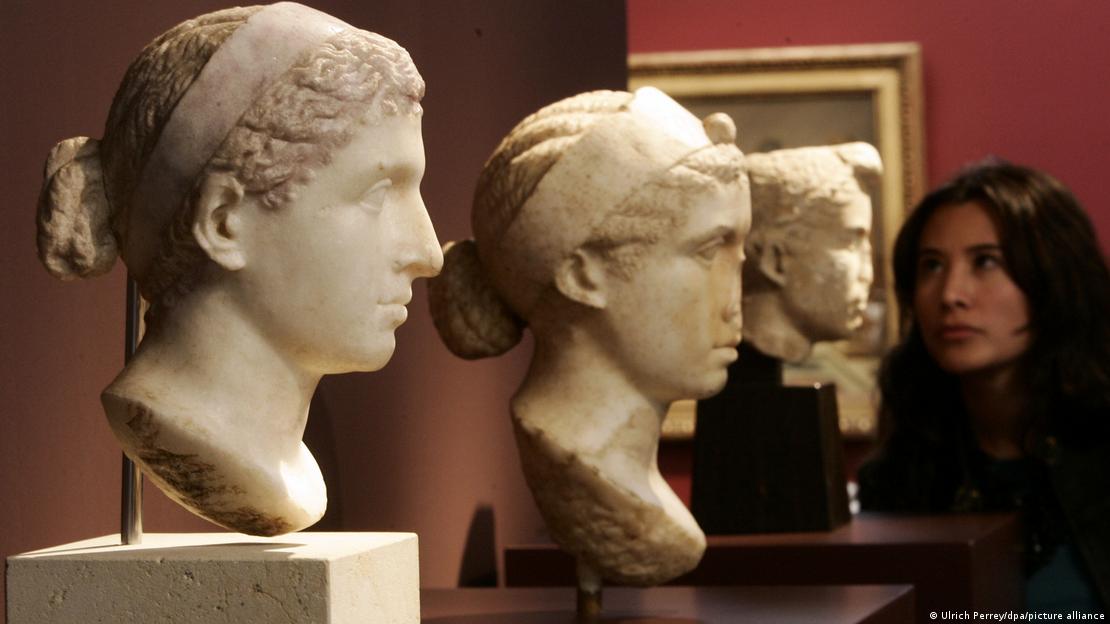Contemporary depictions of historical figures shape our idea of what a person might have looked like.
Since her leading role in the Oscar-winning 1963 film Cleopatra, Elizabeth Taylor has been regarded as a logical and rarely questioned image of the Egyptian pharaoh.
A member of the Ptolemaic dynasty, Cleopatra was a descendant of its founder, Ptolemy I Soter, a Macedonian-Greek general and companion of Alexander the Great.
But no one actually knows what Cleopatra really looked like. The ethnic origin of her mother, meanwhile, is unclear.
A Netflix series now paints a new picture of the Queen of the Ptolemaic Kingdom of Egypt from 51 to 30 B.C. The four-part documentary series Queen Cleopatra started on May 10. But even before the start of the series, its trailer already caused a stir. Why?
The leading role has been taken on by Adele James — who is, as she describes herself in an interview with the UK’s Express, a “bi-racial woman.”
Egypt’s Identity ‘Erased’?
The casting of the British actress has sparked criticism in Egypt.
Egyptian lawyer Mahmoud al-Semary filed a complaint against Netflix with the public prosecutor’s office stating that the streaming service should be blocked, adding the casting of Cleopatra as a Black woman would “distort and erase Egypt’s identity.”
Historians — among them the Egyptologist and former Minister of Antiquities Zahi Hawass — said:
Cleopatra was Greek, which means she was fair-skinned, not Black.
Egypt’s Ministry of Antiquities also got involved in the controversy, publishing a lengthy statement quoting experts who all agreed that Cleopatra had “white skin and Hellenistic features.”
For Mostafa Waziri, the head of the Supreme Council of Antiquities, the portrayal of the famous queen as Black is nothing less than “a falsification of Egyptian history.” This is not racist, he says, it is merely to “defend the history of Queen Cleopatra, which is an important part of Egypt’s history in antiquity.”
What is it really about?
There is pictorial evidence of Cleopatra VII, born in 69 B.C. She is depicted on coins from Alexandria in 51 B.C. and from the Palestinian city of Ascalon from 49 B.C.
The Berlin Collection of Classical Antiquities owns a bust that was produced between 50 and 26 B.C. and is very similar to the images on the coins. The historical legacies do not provide any information about the skin color.
It is more likely that Cleopatra looked like Adele James than Elizabeth Taylor, wrote Tina Gharavi, director of “Queen Cleopatra” in an article for Variety. Apparently, white skin color gives a character a special value, “and for some Egyptians that seems to be really important.”
‘Creative Decision’
Gharavi points out that Cleopatra’s family had been living in Egypt for 300 years at the time of her birth: “So was Cleopatra Black? We don’t know for sure, but we can be sure that she was not white like Elizabeth Taylor.”
The director calls for a conversation to be had about the “internalized white supremacy that Hollywood has indoctrinated us with.”
Netflix called casting Adele James in the role a “creative decision” that should be seen as “alluding to the centuries-old debate about the ethnicity of the ruler” as well as Egypt’s multicultural population at the time.
Appearance Engages Science and Culture
Debates about Cleopatra, who died more than 2,000 years ago, endure. Scientists have tried to find out what the ruler might have looked like with elaborate reconstructions and forensic procedures.
Projects in the cultural sector cause far more of a stir. When Angelina Jolie was supposed to play the pharaoh in a film version that has since been scrapped, it was met with criticism, as was the casting of the Israeli actress Gal Gadot for a film that is to be released in 2024.
“If you want to stick to the facts, Cleopatra was Macedonian. We were looking for a Macedonian actress, there wasn’t one,” Gadot told BBC Arabic.
In both cases there was the accusation of so-called whitewashing, the casting of non-white roles with white actors and actresses. In the case of Queen Cleopatra, Egyptian critics are now accusing the production of doing the same, but with the ethnicity reversed.
Culture war over Cleopatra
“We don’t often get to see or hear stories about Black queens,” Netflix quotes the series’ producer Jada Pinkett Smith, wife of Will Smith, as saying in advance. Access to historically significant women is difficult, but important, because they “formed the backbone of African nations.”
The culture war over Cleopatra has a profound cause. Cleopatra was “representative and stand-in for Egyptian high culture with its influence on Greece and thus on the emergence of Western civilization,” wrote Gesine Krüger, professor of modern history and non-European history at the University of Zürich, in 2013, in her article “Out of Africa? The Black Cleopatra in Contemporary Debates.”
In the United States, Black people have been primarily portrayed as protagonists of slavery and more recently of liberation, writes Krüger, but definitely “as part of a white history of emancipation and progress.”
Through the reference to Cleopatra and African Egypt, the Black community “not only has something to contribute to American history, but in a sense stands at its civilizational beginning.”
The current discussion is also perplexing in light of the fact that questions of skin color and “race” played no role in antiquity.
Meanwhile, the lead actress Adele James posted on Twitter: “If you don’t like the casting, don’t watch the show.”
Visit the Lens celebrity portal to find out more about your favorite stars.











